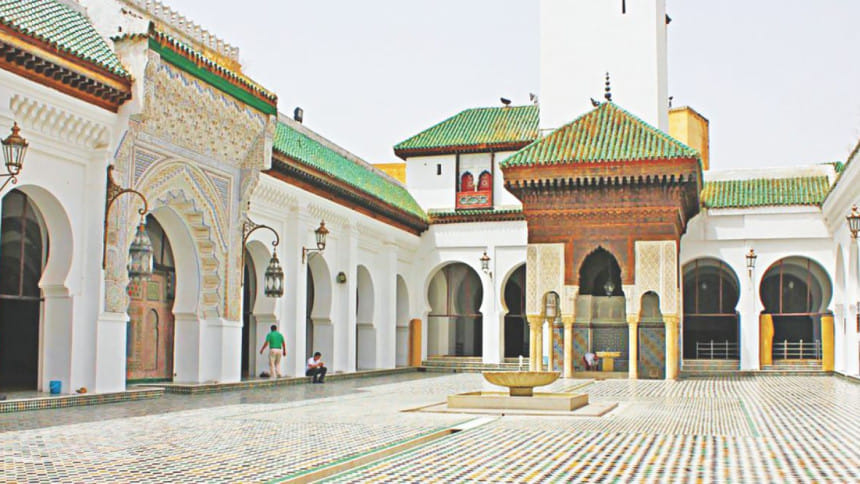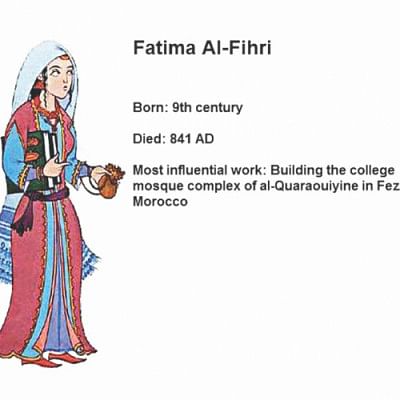Fatima Al-Fihri

Muhammad Bin Abdullah Al-Fihri Al-Quaraouiyine (pronounced "karaween") was born in the city of Al-Qayrawan in today's Tunisia. He migrated to Fez in today's Morocco. Fez was then under the Idrisid dynasty. Fez was destined to become the "Athens of Islam". Muhammad and his family would play a vital role in this feat.
Muhammad became a very successful merchant. He had two daughters, Fatima Al-Fihri and Maryam Al-Fihri. His daughters were taught at home as was the tradition. After Muhammad's death, Fatima inherited a lot of wealth. Fatima inherited further wealth after the death of her husband. She could have spent the rest of her days in comfort but she decided to take Robert Frost's "less traveled" road and that made all the difference.
In Ramadan of 245 Al-Hijri (859 AD), Fatima Al-Fihri started building a mosque. She named it Al-Quaraouiyine in honour of the city Al-Qayrawan from where her ancestors came. During the building of the mosque, Fatima fasted each day. Beside the mosque she established a madrassa where education of the highest standard would be provided.
Eighteen years later Fatima broke her series of fasts when the mosque was completed. Al-Quaraouiyine sealed its place in history as the world's first university. Centres of learning have existed from antiquity. However, ancient civilisations never started a degree-awarding education and institutionalised academic research through departments. Fatima Al-Fihri's model would become the model of universities of today. The university still exists. Its doors are still open to all who seek knowledge.
Al-Quaraouiyine was way ahead of its time: 100 years before Al-Azhar University in Egypt (est. 975 AD) came into existence, 200 years before Europe's oldest university – Bologna in Italy (est. 1088 AD), and Oxford (est. 1096 AD) – the oldest university in Britain. It was almost 800 years before what is probably the "Athens of our time," Harvard in the USA (est. 1636 AD).

As time went by, the mosque of Al-Quaraouiyine became the largest mosque in Africa with a capacity of 22,000 worshippers, and Al-Quaraouiyine University earned the reputation of the "Athens of Islam".
When it came to knowledge, Islam has never had reservations or prejudices. Al-Quaraouiyine University attracted minds from all corners of the known world. A student's religious and social background was not a factor that could disqualify their enrolment. European universities also started as religious institutions like Al-Quaraouiyine; enrolment was not purely on merit, but on other factors too. The legacy of a university lies in the marks of its alumni. Al-Quaraouiyine boasts of alumni who were icons of their times and also in ours.
Born in Córdoba, Spain, the Jewish Rabbi, Musa Ben Maimun (1138-1204 AD) or Maimonides studied at Al-Quaraouiyine. He is history's leading scholar of the Torah (Old Testament). Born in Ceuta, Spain, Muhammad Al Idris (1100-1165 AD) became one of the finest geographers of his time. His maps inspired Columbus and Vasco da Gama. Joannes Leo Africanus (1494-1554 AD) became one of the finest diplomats of his time. Pope Sylvester II (Papacy 999-1003 AD) was a visiting scholar at Al-Quaraouiyine.
If Cambridge has Newton who changed the world, Al-Quaraouiyine also has two icons that changed their world. Ibn Rushd (1126-1198 AD) or Averroes translated and interpreted Aristotle. It was through his works, Europe re-discovered Aristotle and the Greek scholars. Instead of roaming continental Europe, if only Adam Smith, the founder of Economics, had made a trip to Al-Quaraouiyine. In their library, he would have read Ibn Khaldun (1332-1406 AD). Smith would have seen many of his ideas in Moral Sentiments (1759) – written or thought about 400 years before his time.
It took centuries for women to liberate themselves in the west. Meanwhile, women during the golden age of Islam contributed equally with men. The list is not small. Maryam Al Asturlabi of Aleppo (10th century) was a famous astronomer. Lubna of Córdoba (10th century) was a slave who became a mathematician and poet, par excellence in the Umayad palace in Andalusia. Zaynab Binte Ahmad (14th century) of Damascus was a leading scholar in jurisprudence. She was also the teacher of the famous traveller, Ibn Battuta.
Fatima Al-Fihri and Al-Quaraouiyine are one of the numerous testimonies to how Islam contributed to mankind what many today may no longer be aware of.
Asrar Chowdhury teaches economic theory and game theory in the classroom. Outside he listens to music and BBC Radio; follows Test Cricket; and plays the flute. He can be reached at: [email protected]

 For all latest news, follow The Daily Star's Google News channel.
For all latest news, follow The Daily Star's Google News channel. 



Comments